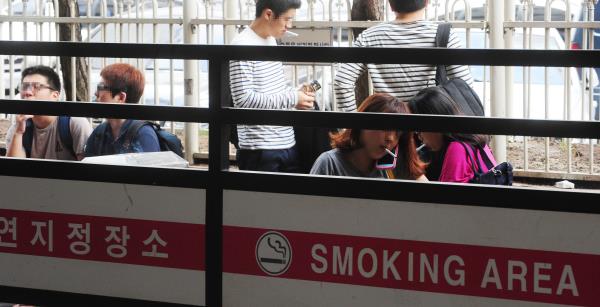The government is expected to revise its smoking cessation support programs for hospitals due to the declining number of participants. The government started the program in 2015.
The Ministry of Health and Welfare is expected to announce a “comprehensive plan for smoking cessation” later this month which will include an improvement measure.
An official at the health promotion division at the ministry revealed the plan at a meeting with reporters.
According to the official, over 12,000 hospitals have registered for the state-subsidized tobacco control program.
However, only about 7,000 hospitals had a record of an actual treatment within the last three months, and the number has been staying at a similar level from 2017 to March 2019.
The number of participants in the anti-smoking program was on the rise from 228,792 in 2015 to 400,978 in 2017. However, the figure plummeted to 296,000 in 2018.
In the first three months of 2019, the number stood at 85,344, which is considered still low.

The recent drop of smokers trying to kick the habit seemed to have resulted from the arrival of e-cigarettes in 2017 and the rise of smoking rates, the National Health Insurance Service said.
The official at the health promotion division said that although the number of clinics participating in the government’s program increased, the number of participants decreased.
“People who have a will to stop smoking have already used the service at a hospital, public health center, or a community counseling center. We should maintain education for them, but this is not working very well,” he said.
The official went on to say, “Physicians complain that they have to claim reimbursement for smoking cessation consultation separately from the conventional system. So, we might integrate our system with that of the NHIS.”
According to the official, the Board of Inspection and Audit is expected to release the result of the October-November audit on the health and welfare ministry’s smoking cessation program this month. The ministry will reflect the outcome on the upcoming comprehensive plan, he said.
However, the comprehensive plan will not include any content related to reimbursement for the anti-tobacco treatment, and the ministry does not plan to allow new payment for pharmacists’ consultation for a fight against smoking, he added.
With the state program underperforming, Pfizer Korea’s sales of anti-smoking drug Champix were also falling.
According to Pfizer Korea, Champix’ quarterly sales continued to slide from 12.8 billion won ($10.8 million) in the first quarter last year to 6.8 billion won in the fourth quarter, and to 2.7 billion won in the first quarter this year.
The decline of Champix sales was attributed to the introduction of Champix’ generic copies in November, and the lowering of Champix price under the smoking cessation program from 1,800 won to 1,100 won.

